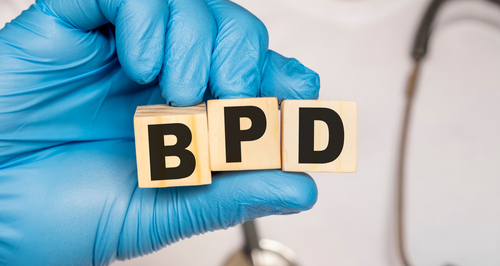
Borderline personality disorder (BPD) is listed in the Diagnostic and Statistical Manual of Mental Disorders, Fifth Edition (DSM-5) as a chronic mental health disorder. It characterized by a pervasive pattern of instability in interpersonal relationships, self-image issues, and difficulty managing emotions and behaviors, which interfere with one’s ability to function in everyday life. The symptoms of BPD will often result in reckless and hasty actions, negatively affecting one’s relationships. The cause for borderline personality disorder remains unknown. However, the National Institute of Mental Health (NIH) alludes to research that “suggests that genetics, brain structure and function, and environmental, cultural, and social factors play a role, or may increase the risk for developing borderline personality disorder.” Though these factors can contribute to one’s susceptibility for developing BPD, exposure to one or more risk factors does not indicate an individual will inevitably to go on to develop borderline personality disorder. Most commonly, BPD develops in early adulthood, often with more severe symptoms occurring in the early stages of onset.
Effects on Relationships
Borderline personality disorder directly affects how one feels about him or herself, one’s behavior as well as how an individual can relate to others. According to the DSM-5 key signs and symptoms of BPD that will have a direct effect on one’s relationships may include:
- Unstable personal relationships that alternate between idealization and devaluation, sometimes referred to as splitting
- Frantic efforts to avoid real or imagined abandonment by family and friends
- Impulsive behaviors resulting in dangerous outcomes (e.g., engaging in unsafe sex, reckless driving, abuse of drugs, etc.)
- Distorted and unstable self-image, affecting one’s moods, relationships, goals, values, and/ or opinions
- Self-harming behavior (e.g., suicidal threats)
- Chronic feelings of emptiness and/ or boredom
- Periods of intense depressed mood, irritability and/ or anxiety lasting anywhere from a few hours to a few days long
- Dissociative feelings
- Intense, inappropriate, and/ or uncontrollable anger, typically followed by feelings of guilt and/ or shame
People with borderline personality disorder have a more difficult time returning to an emotional baseline, which can make sustaining relationships challenging. The quick changing nature of BPD symptoms (e.g., emotional peaks and valleys) can lead to conflict-filled, chaotic relationships. Hence, people with BPD typically have rocky relationships with others, both platonic and romantic.
Treatment
Although BPD is a chronic condition, there are a variety of treatment options available for a person diagnosed with borderline personality disorder. Treatment for BPD will help an individual learn strategies, techniques, and tools to effectively manage the symptoms associated with borderline personality disorder, reducing the severity of symptoms experienced and increase one’s quality of life. Every individual is different and will require a somewhat tailored treatment plan when it comes to BPD. Often treatment plans include a combination of medication and psychotherapy (e.g., dialectical behavior therapy, cognitive behavioral therapy, etc.). Some individuals that experience severe symptoms will require inpatient, intensive care, while others may never need emergency care or hospitalization. With proper treatment an individual can have healthy relationships despite BPD.
Disclaimer:
The information above is provided for the use of informational purposes only. The above content is not to be substituted for professional advice, diagnosis, or treatment, as in no way is it intended as an attempt to practice medicine, give specific medical advice, including, without limitation, advice concerning the topic of mental health. As such, please do not use any material provided above to disregard professional advice or delay seeking treatment.
